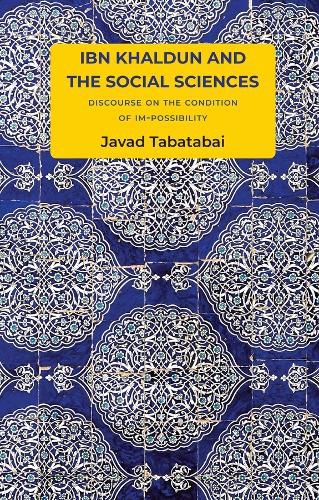Ibn Khaldun and the Social Sciences
Javad Tabatabai

Ibn Khaldun and the Social Sciences
Javad Tabatabai
Arabic and European studies of Ibn Khaldun, the great medieval polymath, follow one of two paths. In one direction, scholars interpret his Muqaddimah ('Prolegomenon'), written in 1377, as the point at which the new social sciences emerged. They identify Ibn Khaldun's 'new science of culture' as sociology or as an 'Islamic' alternative to sociology. In the other direction, the interpretation of Khaldunian discourse is confined to the Islamic-Aristotelian paradigm of its time. The epistemological novelty of the Muqaddimah is dismissed and the science of culture is perceived as a minor contribution to the Aristotelian curriculum.
Charting a different path, Javad Tabatabai's highly original book is an enquiry into the condition of the im-possibility of the social sciences in the Islamic-Aristotelian paradigm. It theorizes the condition of im-possibility of the 'scientific revolution' as the 'epistemic obstacle' to modernity in Islamic civilization. This theorization revisits Michel Foucault's discussion of the condition of possibility of the human sciences in light of the history of Christian-Aristotelian thought and the broader French debates about epistemology from Bachelard to Althusser.
Javad Tabatabai offers a critical theory of tradition and modernity in the Middle East, elaborating on a historical situation where social and human sciences emerged by way of colonial and post-colonial translations of discourse from Europe, and in a historical and epistemological break with inherited traditions of knowledge. In this situation, Tabatabai highlights the significance of reactivating Ibn Khaldun's critical reckoning with the limit of inherited traditions as the political-theological horizon of renewal.
Order online and we’ll ship when available (7 January 2025)
Our stock data is updated periodically, and availability may change throughout the day for in-demand items. Please call the relevant shop for the most current stock information. Prices are subject to change without notice.
Sign in or become a Readings Member to add this title to a wishlist.

